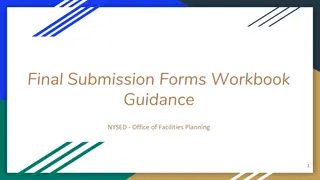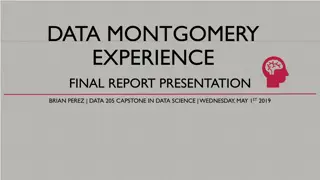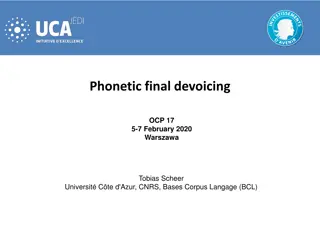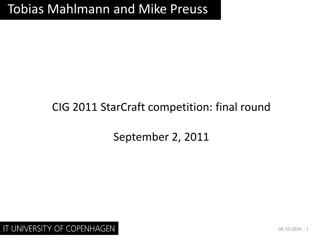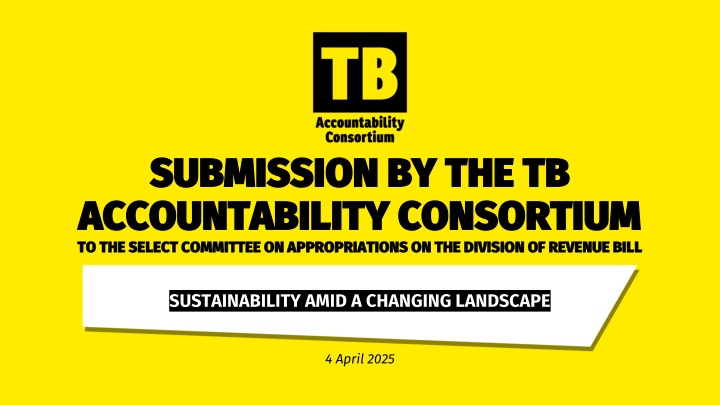
Challenges and Allocations in Public Healthcare Funding Report
"Explore the challenges faced by publicly funded healthcare systems, including decreased allocations, financial management issues, and the impact of funding withdrawal. The report highlights specific budget allocations, HR impacts, and regional breakdowns to address sustainability amid changing landscapes."
Download Presentation

Please find below an Image/Link to download the presentation.
The content on the website is provided AS IS for your information and personal use only. It may not be sold, licensed, or shared on other websites without obtaining consent from the author. If you encounter any issues during the download, it is possible that the publisher has removed the file from their server.
You are allowed to download the files provided on this website for personal or commercial use, subject to the condition that they are used lawfully. All files are the property of their respective owners.
The content on the website is provided AS IS for your information and personal use only. It may not be sold, licensed, or shared on other websites without obtaining consent from the author.
E N D
Presentation Transcript
SUBMISSION BY THE TB SUBMISSION BY THE TB ACCOUNTABILITY CONSORTIUM ACCOUNTABILITY CONSORTIUM TO THE SELECT COMMITTEE ON APPROPRIATIONS ON THE DIVISION OF REVENUE BILL TO THE SELECT COMMITTEE ON APPROPRIATIONS ON THE DIVISION OF REVENUE BILL SUSTAINABILITY AMID A CHANGING LANDSCAPE 4 April 2025
PUBLICLY FUNDED HEALTHCARE IS PUBLICLY FUNDED HEALTHCARE IS DISTRESSED DISTRESSED Allocations to health have decreased in real terms over the last decade despite increases in the cost of health and various pressures on the system. These costs include: Above-inflation increases for healthcare workers crowding out the ability to employ new staff rising medical inflation particular in respect of medicines and equipment Poor financial planning and management Weak supply chain management systems that fail to mitigate the impact of procurement corruption Chronic underfunding as noted by the Minister has contributed to provincial governments carrying over budget shortfalls in excess of R22 billion The withdrawal of overseas development assistance (USAID) resulted in the loss of 15 000 front line staff and further 9000 technical staff including staff at the successful CCMD Programme We welcome the budget proposals with above-inflation increases to the health component of the provincial equitable share as well as the increases in allocations to the NDOH We are disappointed that the allocations to the District Health Programme conditional grant have not included a R6-R8 billion contribution to fill the gap created by the withdrawn USAID investments SUBMISSION BY THE TB ACCOUNTABILITY CONSORTIUM TO THE SELECT COMMITTEE ON APPROPRIATIONS ON THE DIVISION OF REVENUE BILL 4 April 2025 2 2
BROAD FUNDING IMPACT BROAD FUNDING IMPACT Total budget allocation - USD488m 52% CDC/48% USAID Rand terms site level activities = R5b - an additional 8% contribution to the total RSA Health Budget 62% allocated to on-site level activities Gauteng receives 39% of the onsite allocation High-burden TB Provinces receive the following allocation: WC $14.8m or 5% KZN - $11m or 11% EC - $14.1m or 5% Split between on and off-site spend SUBMISSION BY THE TB ACCOUNTABILITY CONSORTIUM TO THE SELECT COMMITTEE ON APPROPRIATIONS ON THE DIVISION OF REVENUE BILL 4 April 2025 3 3
BROAD HR IMPACT BROAD HR IMPACT Site Level Off-Site Level Overall Province Eastern Cape Free State Gauteng KwaZulu-Natal Limpopo Mpumalanga National Northern Cape North West Western Cape Total CDC USAID Total CDC USAID Total CDC USAID Total 63% 33% 46% 77% 1% 15% 100% 100% 100% 3% 48% 37% 67% 54% 23% 99% 85% 0% 0% 0% 97% 52% 1122 393 4926 2309 1754 1575 85 10 1898 935 15007 56% 6% 31% 43% 6% 9% 54% 33% 88% 33% 36% 44% 94% 69% 57% 94% 91% 46% 67% 12% 67% 64% 720 281 3248 1494 436 896 921 60% 22% 40% 64% 2% 13% 58% 85% 98% 17% 43% 40% 78% 60% 36% 98% 87% 42% 15% 2% 83% 57% 1842 674 8174 3803 2190 2471 1006 13 2338 1753 24264 3 440 818 9257 SUBMISSION BY THE TB ACCOUNTABILITY CONSORTIUM TO THE SELECT COMMITTEE ON APPROPRIATIONS ON THE DIVISION OF REVENUE BILL 4 April 2025 4 4
THE STATE OF TB IN SOUTH AFRICA THE STATE OF TB IN SOUTH AFRICA TB remains the leading cause of death in South Africa with estimated 56 000 deaths annually. An estimated 270 000 people contracted TB in South Africa in 2023 It is encouraging to note that since 2015 the annual death rate has declined significantly largely as result of the sharp rise in people living with HIV initiated into life saving Anti- Retroviral Treatment (ART). HIV/AIDS remains the significant contributor to TB mortality with estimated 57% of deaths diagnosed in hospital, which is often too late South Africa has 10 years to meet the WHO s End TB targets Incidence rates have reached the 2025 End TB Strategy targets, SA still has to increase the treatment coverage rate by 13% and reducing TB deaths by 46,000 per year. There are about 65 000 people who are termed missing . They know they have TB but are not on treatment. SUBMISSION BY THE TB ACCOUNTABILITY CONSORTIUM TO THE SELECT COMMITTEE ON APPROPRIATIONS ON THE DIVISION OF REVENUE BILL 4 April 2025 5 5
SAS AMBITIOUS END TB CAMPAIGN SA S AMBITIOUS END TB CAMPAIGN Over the last 10 years the national TB Programme has halved TB incidence, increased TB case finding and reduced deaths. But this is not enough South Africa s TB programme has launched the End TB Campaign which aims to test 5 million people in 2025/26. This will involve diagnosing 250,000 new cases. This is expected to lead to a projected 29% reduction in TB incidence and a 41% reduction in mortality by 2035. To achieve our End TB targets we need accelerate case finding and scale up testing as recommended in the End TB campaign. SUBMISSION BY THE TB ACCOUNTABILITY CONSORTIUM TO THE SELECT COMMITTEE ON APPROPRIATIONS ON THE DIVISION OF REVENUE BILL 4 April 2025 6 6
THERE ARE RISKS TO IMPLEMENT THE THERE ARE RISKS TO IMPLEMENT THE CAMPAIGN CAMPAIGN Provinces are responsible for the implementation of National Health Policies which include the implementation of National TB programme strategy To perform this function provinces are funded through the provincial equitable share based on a revised health component formula that includes health care utilisation. Excess mortality as a proxy for unmet health need, multi deprivation indexes as proxy for the social determinants of health which include poverty, education and income While we welcome the R28 billion addition to the equitable share, provincial resource allocation processes are shaped by historical spending with limited room for fully implementing national policies. While the additional allocations will fund sector wage increases , allowance for employment of 800 health care professionals . The concern remains that not enough money will be allocated to meet the funding needs of the end TB campaign The reduction in overseas development assistance will further weaken district health capacity with the loss of 15 000 front line health care workers which will impact the effective implementation of the END TB Strategy SUBMISSION BY THE TB ACCOUNTABILITY CONSORTIUM TO THE SELECT COMMITTEE ON APPROPRIATIONS ON THE DIVISION OF REVENUE BILL 4 April 2025 7 7
RECOMENDATIONS RECOMENDATIONS A yellow poster with a group of people AI-generated content may be incorrect. To mitigate the impact of the USAID funding withdrawal on HIV and TB services we recommend the expansion of the District Health Programme Conditional Grant. This includes increase the funding of the TB component to ensure TB services are adequately funded This will allow for improved financial and programmatic accountability as well as facilitating improved coordination of the response to HIV/AIDS TB and STI Improving the effectiveness of the funding and the strategic priority that the governance of the grant be included in the national health council deliberations through the establishment of special committee that is co chaired by the National AIDS Councils https://tbac.org.za/publications/ SUBMISSION BY THE TB ACCOUNTABILITY CONSORTIUM TO THE SELECT COMMITTEE ON APPROPRIATIONS ON THE DIVISION OF REVENUE BILL 4 April 2025 8 8




